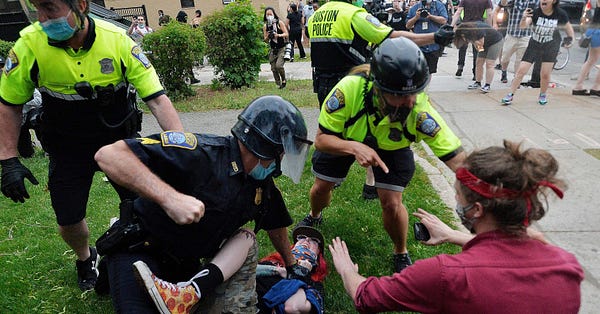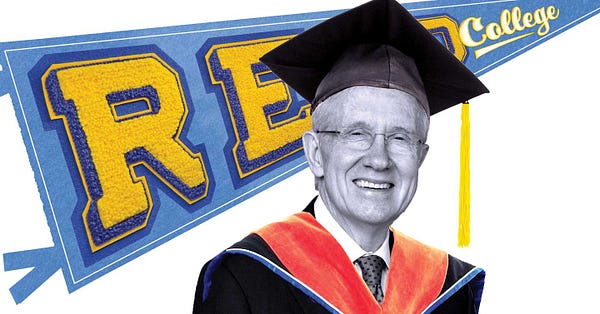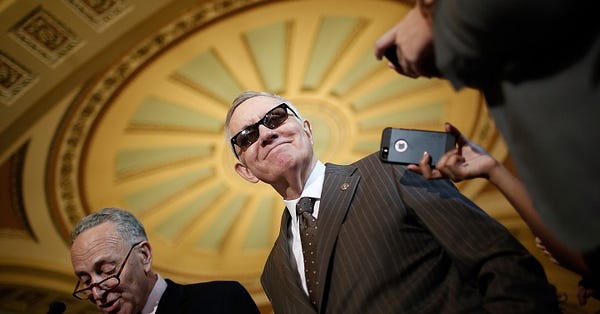It’s become a sort of social media tradition for journalists to post a thread of their best/favorite/most popular articles of the past 12 months at the end of the year.
I’ve done this on Twitter, posting a collection, usually month by month, of my best work.
But now I have a newsletter people read and more space to put one together—so that’s what I’m going to do. Below you’ll find my month-to-month best of 2021.
Enjoy, and thanks for being on this journey with me.
Check out my interview with Jeet Heer on the year in politics.


If you’re not a paid subscriber yet, please consider an annual subscription. Next year will bring some changes for the newsletter—take advantage of the sale I’m running through the end of the day.
January
After I broke the story of the involvement of the Massachusetts Democratic Party in the Alex Morse scandal in August 2020, I stayed on the story for The Intercept.
In January, a young party member named Dan Totten raised the issue of the party’s treatment of Morse during a meeting of the Cambridge Democratic City Committee in Cambridge, Massachusetts. It didn’t go well, with one of the other members on the call uttering a homophobic slur.
As the process stretched into its third hour, Goverman blurted out the slur after Totten voted. The slur was the subject of fallout later in the meeting, as members called for Goverman to resign from the city party.
Totten wrote about his experience in the local newspaper Cambridge Day and told The Intercept that he was in fact more bothered by the subtle homophobia on display in the meeting before the slur was uttered.
“At this point in the meeting, I knew we were going to lose the vote by five or six votes,” Totten said. “If this homophobic slur had come in a different context, I’d have been much more taken aback. But here I was like, you know, that’s kind of the natural extension of the argument that was just made.”


February
I followed up my reporting for The Appeal on the Boston Police Department’s treatment of protesters during the George Floyd protests with a second article featuring exclusive video of misconduct and abuse.
Using footage from police body cams and other observers in Boston and Worcester, I showed how the police in those cities attacked demonstrators with little or no provocation.
Artist and activist Sara Zielinski, who attended the protest, described a sense of unease and confusion from police until just before 7:45 p.m. as officers faced off against demonstrators, forming a human barricade against them.
She described what happened next.
“Suddenly the cops pushed through that barricade and over on the side where I was,” said Zielinski. “A couple of us sort of tried to form a barricade using our bodies to keep the cops [away] who were on this side [from] getting out to and where the majority of people were. And I remember one woman who had a bike just getting pushed to the ground.”


March
My work with Blue Tent continued this year as we transitioned from election site to donor one-stop shop for organization info.
In March, I detailed how Democrats and progressives alike can hope to make gains in North Carolina. There’s a path forward—if they’ll take it.
Wamiq Chowdhury, an attorney and member of the Democratic Socialists of America’s Chapelboro Branch, told Blue Tent that Republican power in the state will prove hard to shake, at least in the short term, without a reimagining of Democratic Party priorities.
“The GOP here has been very effective at what they generally do—take control of key institutions and bend them to make it very difficult to break that control,” Chowdhury said. “On the state level, the Dems operate much as they do elsewhere, clinging to traditional political wisdom that gets discredited more every day.”


April
I continued my reporting on the Boston Police Department at The Flashpoint, breaking the story that Clfiton McHale, the sergeant who bragged about running down protesters, was back on duty.
Despite being under investigation after admitting on camera that he used a police vehicle as a weapon to run down protesters during an anti-racism demonstration last May, Boston Police Sergeant Clifton McHale is back in the squad room.
"Sgt. McHale is on desk duty," Boston Police Department spokesman Sergeant Detective John Boyle told me in an email. "Each investigation is unique, but it is normal practice."
May
The Flashpoint really kicked off with this story about how Covid affected—and in some ways destroyed—the restaurant industry. I talked to workers around the country about their experiences working in the business and how Covid laid bare the inequities of the industry.
A number said they weren’t going back.
Many service industry workers came out of pandemic lockdowns with a clear view of just how underpaid they really are after making far more from boosted unemployment insurance than they had made at their jobs.
Mark was laid off at the beginning of the pandemic. Once he went on unemployment, he said, things changed—for the better.
“I made more money on unemployment than I did working at the bar because they only gave me lunch shifts and I was part time,” Mark told me. “They also over-staffed so there were fewer tips per person, I went from making $250-ish a week to a solid $600 a week from unemployment.”
June
In June, I was tipped off to conspiracy theorist Naomi Wolf’s participation in a “Juneteenth”-themed anti-vax event.
Organizers and supporters of the group behind the event, Do We Need This?, said there was nothing wrong with the conflation of Juneteenth and anti-vax conspiracies.
Event organizer Kathryn Levin told me that in her view, it's appropriate.
"The 19th is a day of emancipation, and it's a day when we claim our freedom," said Levin. "It's when we see that we are not slaves to mandate. It's when we take our power back."
I asked Levin how she analogized American chattel slavery—where slaves were whipped, beaten, raped, and murdered by their white masters for centuries—to the temporary restrictions over the last 15 months due to the pandemic.
"We have been enslaved by our government," she replied.
July
I continued my anti-vaxxer reporting throughout the year. In July, I wrote for Business Insider about how the movement was still killing people even during a brief respite from the virus.
Far right figures, New Age grifters, and the modern GOP all coming together around vaccine resistance shows the strange bedfellows that the conspiracy theory has created. But at a closer look, they're not so dissimilar.
Conspiracy theories rely on simplistic explanations for complex systems and events. Whether it's the fear of a cabal of elites controlling your every move whose actions determine the course of history, or the belief that vaccine developers aim to rewrite your DNA, these fear-based approaches to explaining the world have their appeal.


August
At The Nation, I wrote about former Senate Majority Leader Harry Reid and his staffers, many of whom have gone on to positions of power and influence in the Democratic Party.
I talked to Reid and people from his office to get a sense of what it was about this moderate that appealed to the left.
They painted a picture of a charismatic, quiet figure who understood power.
Not everyone was on board with Reid’s plan to attend the conference and embrace progressive bloggers. According to Ari Rabin-Havt, some Reid staffers urged the senator to use the opportunity to stage a “Sister Souljah moment” and decry the party’s left. (At a Rainbow Coalition convention during the 1992 Democratic primaries, Bill Clinton denounced the presence of the rapper Sister Souljah, accusing her of inciting violence against white people.) Rabin-Havt said he was apoplectic: “I was like, ‘Guys, these are the people funding your fucking campaigns. Are you really going to tell them to fuck off? That’s crazy. You don’t go to somebody’s house to insult them.’”
Reid agreed with Rabin-Havt and gave a speech broadly aligning himself—and, by extension, the Senate Democratic Caucus—with the online left. The speech became a turning point, Rabin-Havt said. From then on, Reid was able to count on the support of influential lefty bloggers.


This morning, I wrote an obituary of sorts for Reid drawing on that reporting, you can read it here.
September
I debuted at The Atlantic in September, writing about how lefty anti-vaxxers in the Berkshires of western Massachusetts and in Columbia County, New York have been tilting to the right.
It’s an unsettling, disturbing trend.
Anti-vaxxers in the Taconics-Berkshires region include local organic farmers, members of homeschooling and alternative-education communities, anti-war hippies, and the occasional alt-right conspiracist. The anti-vax faction here has its roots in the left-libertarian politics of the Back to the Land movement, which flooded the area with the disaffected urban upper-middle class in the 1970s and ’80s. That influx of hippies and students, most of whom came from New York City, brought with it a political belief in naturopathy and a mistrust of institutional authority.
Today, these crunchy anti-vaxxers are coalescing into a loose political group that is targeting COVID health measures and restrictions as indicative of governmental overreach and medical tyranny. They’re also, predictably, falling down far-right rabbit holes. For more science-minded people who have roots in the region, seeing old friends turn to outlandish, anti-science conspiracy theories can be disheartening, Melissa Pourpak, who grew up in the area and has a doctorate in genetics and molecular biology, told me. “It is shocking and saddening to me that such illogical statements are often heard in a place that used to be known for being a whole lot smarter than that,” Pourpak said. “Did all the progressives leave?”


October
With student loan repayment restart on the horizon (before the Biden administration extended the freeze this month) I chatted with borrowers about their fears and frustrations.
One borrower, Jim, told me he has paid off around $37,500 of $55,000 in private loans over the past five years—but his overall balance has only gone down $8,000. He told me that crushing debt is a factor in a number of other life decisions.
“Definitely a cause of depression and anxiety, pushed off getting engaged and married to my significant other, I avoid all other debt because I am genuinely afraid of a deeper hole,” Jim said. “Saving is near impossible between rent and loans.”
November
Companies desperate for workers are willing to do nearly anything to get employees in the door—nearly.
I talked to workers and prospective employees about the use of wage lies to get people to apply for jobs, promising them one wage in ads and preliminary interviews before revealing far lower starting wages with the job offer.
Alex, a 35-year-old who recently moved to Miami, answered a posting through the online employment marketplace Snagajob offering $16 an hour to work in a technology sales position at Staples. At the end of the interview, the manager revealed that the pay was actually $10 an hour.
“When I replied that the posting for the job clearly said $16 an hour, he chuckled a bit and said ‘key holders don't even make that much, I think the highest paid position is about $13 an hour,’” Alex told me. “I had no choice but to take the job while pursuing other opportunities but I was very put off that companies are allowed to outright lie about a position's compensation.”
The low pay has a ripple effect, Alex explained.
“I'm sure I don't need to remind you that $10 an hour in Miami, even at full-time, doesn't even cover rent and utilities, let alone food, gas, and car insurance,” Alex said.
December
As the electorate is getting younger and leaning further left, democrats continue to tack right. That’s sent many progressives to a politics that rejects electoralism, they told me, with the Obama years and failed Bernie Sanders campaigns major moments in their political evolution.
In 2008 a generation of first-time voters and other progressives, mostly millennials, saw their pick for president reach the White House. President Barack Obama rode a wave of youthful enthusiasm and promises of progressive change to victory—but once he was in office, his actual governing ideas proved different.
“I did that whole register people, drive them to the polls, have an election party with $5 champagne for Obama's first election,” Megan, a 36-year-old from Oklahoma, told me. “Because change and all that. And then nothing happened.”
Other things happened this year. I started a podcast! Check it out here.
Thanks for reading. More to come next year.
If you liked this story, please consider a paid subscription.






hey there- sorry to hijack this post, but i don't see an email address anywhere to contact you. it seems like you have a connection with the state of Maine, so i just wanted to link this story in today's portland press herald about employees walking out of the portland pie company portland location to protest management's treatment of the workers generally and management's approach to COVID protocols at the resturant. i was thinking it would be a story you could pursue (now that i'm typing this out, i suppose you have sort of covered this already, but it plays into the ongoing narrative of the working class struggle during the pandemic) and because you seem to be linked into the state, maybe there is a way you could actually talk directly with some of the employees and get some more details than the pph was able to (honestly i'm not really a big fan of the newspaper so i bet there's more there that could be teased out). i hope this doesn't come off as backseat driving, i just thought of your newsletter here when i saw this story this morning.
link: https://www.pressherald.com/2022/01/03/portland-pie-co-workers-walk-out-in-protest/
unfortunately, they have the strongest paywall that i have come across. if you refresh and cancel the refresh enough times, you'll eventually be able to get around the paywall.